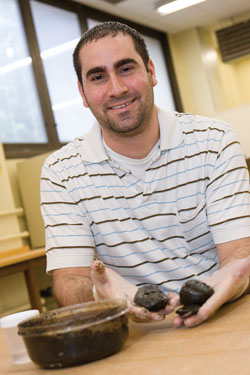|
For the past two summers, Botrus, 24, has been part of a research team under the direction of Temple Civil and Environmental Engineering Chair Michel Boufadel that has been studying why oil from the Exxon Valdez still plagues the beaches of Alaska’s Prince William Sound, 20 years after the accident.
Hometown: Crosbies, Antigua
What was it like coming from the Caribbean to the Northeastern United States?
It did take some adjusting coming from a small island. It was definitely a change coming from the British system, the British style of writing, coming to the American way. When I took college English, I spelled words like color and neighbor with a ‘u’ the British way, so it took some adjusting. Since English is our primary language in Antigua, the adjustments were minor.
How did you wind up at Temple?
I started out at Lehigh-Carbon County Community College, which had just entered into an agreement with Temple Engineering where you could get a bachelor’s of science in engineering technology. I applied for that program, but when I came here for orientation, I realized that degree wasn’t for me. I wanted a bigger challenge, so I enrolled for a bachelor of science in mechanical engineering, which I earned in 2007, and that brought me to the main campus.
|
 Photo by Joseph V. Labolito/Temple University Photo by Joseph V. Labolito/Temple University
|
|
How does a mechanical engineer end up working on an environmental engineering project?
When I was applying for graduate school, I was looking for an assistantship and the director of graduate studies in mechanical engineering directed me to Dr. Boufadel. His research in the dynamics of waves was mechanically related and can help in understanding how to remediate oil spills.
What was it like working on the Exxon Valdez Project?
Being that I was only five years old and living outside the country when the spill occurred, I never really had the understanding of what it actually meant. When we got to Alaska and we discovered the oil in the beaches, that’s when it really hit me about the impact that this oil spill caused, even 20 years later. You move a few rocks and there is the oil and it’s still fresh
Describe the differences in the beaches of Antigua and Alaska:
I came from a place where the beaches are of sand. You can dig three feet down and still have sand. Some beaches even have sand with slight tint of pink to them. That’s what we consider a ‘beach.’ What we saw in Alaska were beaches made up of rocks, cobbles, even down to pebbles and you wouldn’t even dare to lay down on it. The definition of a ‘beach’ had a completely opposite meaning when we got up there.
Who has had the most influence on you at Temple?
Definitely Dr. Boufadel. In the past four years at Temple, I’ve worked harder and I’ve had a lot of opportunities working under him —working with him on multiple projects, attending a conference with him, writing a conference proceeding and working on my own research. Working with him has opened a lot of doors for me. I’m definitely grateful to him for what I’ve accomplished.
What are your future goals?
Right now, the main thing on my mind is to get a job. Ideally, in the future, I hope to be a registered professional engineer. That’s what I’m working towards.
|
 Photo by Joseph V. Labolito/Temple University
Photo by Joseph V. Labolito/Temple University